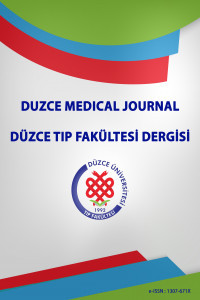MEFV GENİNDE S288Y (P.SER863TYR, C.863 C>A) MUTASYONU VE KLİNİĞİNİN ARAŞTIRILMASI
Ailesel Akdeniz Ateşi (FMF) otozomal resesif kalıtılan, kendini sınırlayan ve tekrarlayıcı karınağrısı, sinövit, plevrit ataklarıyla karakterize bir hastalıktır. MEFV genindeki mutasyonlarhastalığa sebep olmakta ve genin ürünü olan pyrin/marenostrin proteini inflamatuarreaksiyonların regülasyonunda görev yapmaktadır. Klinik olarak FMF tanısı konan bir Türkailesinin 4 ferdi incelendi. MEFV geninin tüm ekzonları (1,2,3,4,5,6,7,8,9,10) PCR tekniği ileamplifiye edilip, dört birey için MEFV geninin tüm ekzom dizi analizi yapıldı. MEFV geninin2. Ekzon bölgesinde tek bazlık yeni S288Y (p.Ser863Tyr, c.863 C>A) olarak adlandırılan birmutasyon tanımlandı. Proband aynı zamanda M694V ve R202Q mutasyonlarınıda taşıyordu.Bizim sonuçlarımız probanda ilaveten onun annesinin (M694V,R202Q) ve babasının (S288Y)da mutasyonu taşıdığını gösterdi. Proband’da ateş, aile öyküsü, abdomen ağrısı, göğüs ağrısı,artrit ve eritemi vardı. Atak sıklığı 2 haftada birdi. Vakamız MEFV geninin 2. Ekzonunda bumutasyonun Türkiye’den bildirilen ikinci olgusu özelliğini taşımaktadır. İlk vaka Türkiye’ninGüneydoğusundan rapor edilmiştir ancak bu vaka ile ilgili klinik veri paylaşılmamıştır. Sonuçolarak; ilk vakadan farklı olarak hastalarımızın klinik profillerini tanımladık. Ortayakoyduğumuz bu tek baz değişikliği mutasyonunun FMF patogenezi üzerine yapılacak olançalışmalar için katkı sunabileceğini düşünmekteyiz
Anahtar Kelimeler:
FMF, MEFV Geni, S288Y mutasyonu
Investigation of S288y (P.Ser863tyr, C.863 C>A) Mutation in MEFV Gene and its’ Clinics
Familial Mediterranean Fever (FMF) is an autosomal recessive genetic disease characterisedby recurrent and self-limited abdominal pain, synovitis and pleuritis. The mutations in MEFVgene are responsible from the disease and its protein product, pyrin or marenostrin, plays ancrucial role in the regulation of the inflammatory reactions. A Turkish family with a total of fourmembers clinically diagnosed as FMF are explored. All exons of MEFV gene(1,2,3,4,5,6,7,8,9,10) were amplified using PCR technic and complete exom sequencing analysisof MEFV gene was done for four individuals. A single base mutation named as S288Y(p.Ser863Tyr, c.863 C>A) was identified in exon 2 of MEFV gene. The proband also carriedM694V and R202Q mutation. Our results indicated that in addition to the proband, her mother(M694V, R202Q) and father (S288Y) have carried the mutation, too. His sister has not anymutation. The proband has fever, family history of FMF, abdominal pain, chest pain, arthritis,erythema. The recurrency of the attack is one of 2 week. This is the second report of thismutation in exon 2 of the MEFV gene from a Turkish family. First report was from South-eastof Turkey but we don’t have any clinical information about that case. As a result; we differentlydescribe our patient’s clinic profile. We thought that this single base mutation may provideimportant knowledge for further studies on FMF pathogenesis
Keywords:
FMF, MEFV Gene, S288Y mutation,
___
Tunca M, Akar S, Onen F, Ozdogan H, et al. Turkish FMF Study Group. Familial Mediterranean fever (FMF) in Turkey: results of a nationwide multicenter study. Medicine (Baltimore) 2005;84(1):1-11.Livneh A, Langevitz P, Zemer D, et al. Criteria for the diagnosis of familial Mediterranean fever. Arthritis Rheum 1997;40:1879-1885.
Ben-Chetrit E, Touitou I. Familial mediterranean fever in the world. Arthritis Rheum 2009;61:1447–1453.
The International FMF Consortium. Ancient missense mutations in a new member of the RoRet gene family are likely to cause familial Mediterranean fever. Cell 1997;7:1317–1325.
Ozen S. Changing concepts in familial Mediterranean fever: is it possible to have an autosomal-recessive disease with only one mutation? Arthritis Rheum. 2009;60:1575–1577.
Sönmez E, Batu ED, Ozen S. Familial Mediterranean fever: current perspectives. Journal of Inflammation Research. 2016;9:13–20.
Booty MG, Chae JJ, Masters SL, et al. Familial Mediterranean fever with a single MEFV mutation: where is the second hit? Arthritis Rheum 2009;60:1851–1861.
Rowczenio DM, Iancu DS, Trojer H, et al. Autosomal dominant familial Mediterranean fever in Northern European Caucasians associated with deletion of p.M694 residue-a case series and genetic exploration. Rheumatology (Oxford). 2016; May 5. pii: kew058. [Epub ahead of print].
Sarrabay G, Touitou I. Dominant FMF An unusual inheritance in unusual populations. Rheumatology (Oxford). 2016; May 5. pii: kew203. DOI: 10.1093/rheumatology/kew203
Neudorf U, Lainka E, Kallinich T, et al. Genetic fever syndromes. Hereditary recurrent (periodic) fever syndromes. Z Rheumatol. 2013;7 2(4):332-338.
Timucin Kasifoglu T, Bilge SY, Sari I, et al. Amyloidosis and its related factors in Turkish patients with familial Mediterranean fever: a multicentre study. Rheumatology. 2013;24:1-5.
Infevers 2016. Accessed 16 May 2016. Available from: [http://fmf.igh.cnrs.fr/ISSAID/infevers//.
Oztuzcu S, Ulaslı M, Ergun S, et al. Screening of common and novel familial mediterranean fever mutations in south- east part of Turkey. Mol Biol Rep. 2014;41(4):2601-2607.
Eroz R, Dogan M, Yuce H, et al. A Novel Deletion Mutation 334-335 DelG (P.Glu112fs, C.334-335delg) Identified In Exon 2 Of The MEFV Gene Associated With Familial Mediterranean Fever. Congress abstract, 14. Ulusal Tıbbi Biyoloji ve Genetik Kongresi 27 – 30 Ekim 2015; Ölüdeniz /Fethiye.
Eroz R, Dogan M, Kocabay K. A Novel Mutation K447m (P.Lys447met, C.1340 A>T) Identified In Exon 4 Of The MEFV Gene. Genetic Counselling, Accepted Ref:GC 34/16, 2016.
Eroz R, Dogan M, Yuce H, et al. A Turkish Family With A89T(p. Ala89Thr, c.265G>A). Mutation On The MEFV Gene. Erciyes Medical Journal. 2016;38(1):42.
Eroz R, Dogan M, Yuce H, et al.. A Turkish Family With 761_764dupCCGC(p.Asn256Argfs70,c.761_764dupCCGC). Mutation On The MEFV Gene. Erciyes Medical Journal. 2016;38(1):42.
- Yayın Aralığı: Yılda 3 Sayı
- Başlangıç: 1999
- Yayıncı: Düzce Üniversitesi Tıp Fakültesi
Sayıdaki Diğer Makaleler
KANSERDE ASPİRİN KULLANIMININ ÖNEMİ
ÇEVRESEL SİGARA DUMANI VE ÇOCUK SAĞLIĞI
MEFV GENİNDE S288Y (P.SER863TYR, C.863 C>A) MUTASYONU VE KLİNİĞİNİN ARAŞTIRILMASI
Mustafa DOĞAN, Kenan KOCABAY, Emrah GÜN, Recep ÖZMERDİVENLİ, Recep ERÖZ
Kenan ARSLAN, Recep ERÖZ, Recep ÖZMERDİVENLİ
YABANCI CİSİM ASPİRASYONUNA BAĞLI PNÖMOTORAKS VE SUBKUTAN AMFİZEM OLGUSU
Bahar ÇALIŞKAN, Sedat ZİYADE, Murat ELEVLİ, Süleyman BAYRAKTAR
Nurver AKINCI, Önder KILIÇASLAN
Esra ÇELEBİ, B Bahar ATAOĞLU, Handan ANKARALI, Mustafa ÖZŞAHİN, Özge PASİN, Saf Naz ATAOĞLU
